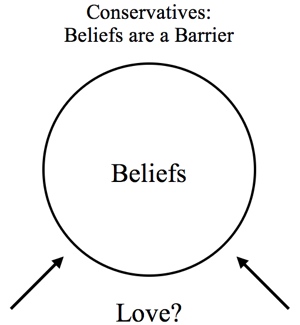Do Right Beliefs Get in the Way of Good Works?
The second question that Michael Wittmer asks in his book Don’t Stop Believing: Why Living Like Jesus Is Not Enough is, “Do right beliefs get in the way of good works?”
Wittmer asks this question because he felt like his very conservative background “reduced the Christian life to little more than an information dump”. His church encouraged people to come listen to about three sermons per week but there was little action that transpired as a result. There was truth but not much love.
On the other hand, he contrasts the conservatives with the “postmodern innovators”. This group seems to be practicing a faith that is exciting. The only problem is they seem to have love but no concern for truth. Wittmer writes, “I appreciate this renewed turn to practice, but wonder why we must turn from doctrine to get there.
So, conservatives might answer the question, “No, our beliefs carry over into good works.” but their lives would not be a reflection of that “belief”. Postmodern innovators might answer the question, “Yes, right beliefs do get in the way of good works” and their lives would be a true reflection of their answer. At least the postmodern innovators are being true to their convictions. Sad, that the conservatives who strongly focus on right doctrine are often the ones being untrue to their convictions.
There’s “nothing that excludes faster than belief” in the minds of the postmodern innovators. They have even gone so far as to say that God’s love is accessible to everyone. The only ones He excludes are those who themselves exclude others or those who opt out and want nothing to do with God. This is seen as a loving position by postmodern innovators.
Wittmer illustrates the two positions like this:


As you can see the conservatives have strong, exclusive beliefs, but are they showing love? On the other hand, the postmodern innovators seem to be showing love to their neighbors, but do they really believe in anything? Peter Rollins, a postmodern innovator said, “When it comes to God, we have nothing to say to others and we must not be ashamed of saying it.” Rollins even eschews evangelism to be evangelized by others, as if other beliefs have as much (maybe even more?) value than does Christianity. Wittmer disagrees and says, “Those communities that downplay the specific, historic doctrines of the Christian faith in order to ‘share experiences and encounter God in other traditions’ will soon become a baptized version of a Rotary or Kiwanis Club.”
So is it really belief if you don’t act? Is it really love if you just accept?
Wittmer does a great job of showing the deeper love that comes as a result of true beliefs. Only Christians can express God’s love to others. He asks, “But what if love is broader than inclusion? What if it means to seek the best for the other, to sacrificially give of yourself so that the other might flourish, and what if the unique items of the Christian faith supply both the model and the motive for doing this?”
As Christians we should believe that we were once living in sin. We believe that God’s grace has rescued from that life of sin and He has forgiven us. This leads, not to another belief, but to an expression of gratitude to God. So, our beliefs have turned into an expression but it doesn’t end there. This gratitude causes us, as Wittmer suggests, to ask “How am I to thank God for such deliverance?” We soon discover that good works are a natural way of showing our gratitude to God. Jesus said, “If you love me, you will obey my commands.” What commands? Without a correct understanding of where we’ve been (sin, death) we will never adequately share with others where they could and should be (grace, life).
We’ve seen the mistakes of the conservatives and the postmodern innovators. So what should it look like to have good doctrine and good deeds? Here’s another illustration from DSB:

Sometimes it is loving and necessary to exclude. Wittmer gives the example of parents who lovingly push their child out of the “nest”, a coach who demotes a player until she begins training harder, or a church that removes an unrepentant member from the privileges of membership. Sometimes, love excludes if love is acting in the best interests of the other.
Another example of mine is that I personally would hate to believe a lie, live for a lie, and die for a lie. Sadly, we must realize that with all the religions in the world believing all sorts of different things, someone is believing a lie. There is either no god, one god, or more than one gods. Only one of those can be true. The truth hurts but it is an act of love to help people to see the truth.
Our beliefs should generate loving deeds to our neighbor. If they don’t then we’ve got a big problem with our beliefs. Our love should be rooted in our belief that God has forgiven us and that He loves us. If it isn’t then our love is empty and worthless (filthy and rag-like I’m sure). Right belief produces right practice. If we leave one out then we don’t have enough respect for Jesus to follow Him the way we should.
This post is the third in a series of posts that will answer the ten questions that Michael Wittmer raises in his book “Don’t Stop Believing: Why Living Like Jesus Is Not Enough”. Learn how you can get a free copy of the book here.
Must You Believe Something to be Saved?
To my conservatively raised ears, this question really sounds irrelevant. Just off the top of my head I think of things like: “Whoever believes and is baptized will be saved, but whoever does not believe will be condemned.” (Mark 16:16 HCSB) and “For God loved the world in this way: He gave His only Son, so that everyone who believes in Him will not perish but have eternal life.” (John 3:16 HCSB) and finally, “if you confess with your mouth, “Jesus is Lord,” and believe in your heart that God raised Him from the dead, you will be saved.” (Romans 10:9 HCSB)
So what’s the problem? Why ask that question?
In his book, Don’t Stop Believing, Michael Wittmer tells us why we have to ask this question. He brings up the question that all conservative Christians have been asked at one time in our lives. Like the father who asked “Would your God send my boy to hell because he never said, ‘Jesus save me,’ but he’d let Hitler go to heaven for saying the magic words?” To my knowledge, Hitler never did say “the magic words”, but this hypothetical scenario gets to the heart of what it means for God to be just. Is it really a few words spoken with sincerity that can make “the everlasting difference between me and the guy in the next cubicle”?
The question about Hitler was posed to postmodern Christian thinker Brian McLaren. He responded by saying that the man’s son “acted a lot like Jesus,” and that “God must be proud of your son.” All this because he did a good deed. Does Brian McLaren know the heart of the son? It seems to me that this enabled the father to conclude that Brian’s God respects good behavior – never mind about good beliefs. God doesn’t need that kind of PR because it doesn’t adequately respect who God is!
And by the way, my answer to the question about Hitler is that God has a track record of redeeming violently evil people. Think of the apostle Paul. What about Sam Berkowitz? To believe that God couldn’t save someone like Hitler shows a lack of faith in God. Had I been in Brian McLaren’s place I would’ve assured the father that God sent His innocent Son to die so that his son could live an abundant life fully in favor with God. Does that sound fair?
It makes me sick to think that a so-called Christian leader could dismiss the justice and mercy and the grand story of God so casually and make it sound like it’s up to your own good behavior to find favor with Him. Again, that’s not the kind of reputation that God Himself presents to us, so why would we spread those lies to others?
These are the reasons why we must answer the question: Must you believe something to be Saved? It’s because of people like Brian McLaren and Spencer Burke (who believes that we begin life accepted by God and that we “stay in his grace, unless we opt out”). Wittmer even describes meeting another influential “Christian” leader who said that we must update our theology to stay relevant to our culture.
There is nothing more relevant than the timeless Truth already given to us by God: We are hopelessly incapable of pleasing God, but God loves us and offers His Son as the ultimate sacrifice for our sins. Hitler doesn’t deserve that kind of forgiveness, but neither do I. I hate to say it, but without God’s grace and forgiveness, I would be closer in morals to Hitler than I would be to Jesus Christ. There is no comparison between my good behavior and God. That’s why good behavior will never be enough.
So why did God decide to let it be about belief and not behavior?
Why won’t He allow us into His kingdom if we can answer affirmatively the questions, “Did you experience joy in life?” and, “Did you help others to experience joy in life?” Why won’t He allow us into His kingdom if we simply follow a good path, but not necessarily the “Jesus path”? Why won’t He allow us into His kingdom simply because our good behavior outweighs the bad?
God made it about belief because His favor cannot be earned. He could’ve made it about love, or acts of kindness, or compassion, or mercy, but those things would then be a source of pride to us. Only belief says we are completely at His mercy. Only belief is humble enough to admit our own weakness and trust in His strength. No one can boast in their belief, as if they have more belief than another. Belief is belief. You either believe or you don’t believe. It doesn’t matter how much or how little belief you have, it’s not about you. Belief admits that it’s all about Him.
“For by grace you are saved through faith, and this is not from yourselves; it is God’s gift – not from works, so that no one can boast.” (Ephesians 2:8-9 HCSB)
I guess some like McLaren and Burke can easily dismiss God’s revealed Word casually, but I can’t. Does that make me a fundamentalist? Well, according to Wittmer, I’m more of a postmodern conservative. I agree with him that it needs to be about belief and behavior, faith and works. Wittmer asks, “Doesn’t God demand right belief and right actions?”
What should we believe?
The part of this chapter in Don’t Stop Believing that I really like is the section on what believers must believe. We must believe that we are sinners and that it is through Jesus that we can find forgiveness. Not too complicated.
But Wittmer takes it a step farther by talking about the truths that a Christian must not reject: the Trinity, the deity and humanity of Jesus, and the “historical truth and significance of Jesus’ life, death, resurrection, and return”. Finally, he advocates for some truths that we all should believe: perfections of God, humans are the image of God, Church is Christ’s body, Bible is God’s Word, Biblical story of creation, fall, redemption, and consummation. Of course, these beliefs may not be understood when someone first receives Jesus as Master of their lives, but if they trust Jesus enough to follow Him, these other truths will be easy to accept.
Wittmer writes, “Contrary to what some postmodern innovators believe, those who reject these foundational doctrines of the Christian faith cannot be saved, no matter how swell they are and how well they behave. Being good is not good enough. We must know and believe something – the basic facts about salvation – to be saved.” He is referring to the “must believe” and “must not reject” categories as essentials to being a Christian. Indeed, it is not enough merely to do good deeds. However, our faith leads to works. Because we recognize the love God has for us, we freely show others grace and compassion and love.
Good belief without good behavior is like mixing in all the ingredients for a loaf of bread but forgetting to put it in the oven. Good behavior without good belief is like putting a loaf pan in the oven without filling it with ingredients. Either way, the world doesn’t get to benefit from the Bread of Life because of our unwillingness to believe or behave in a way that brings glory to God. Belief isn’t really belief if it doesn’t inspire living like Jesus in the first place.
This post is the first in a series of posts that will answer the ten questions that Michael Wittmer raises in his book “Don’t Stop Believing: Why Living Like Jesus Is Not Enough”. Read my introductory post to the DSB series here, and then learn how you can get a free copy of the book here.












4 comments